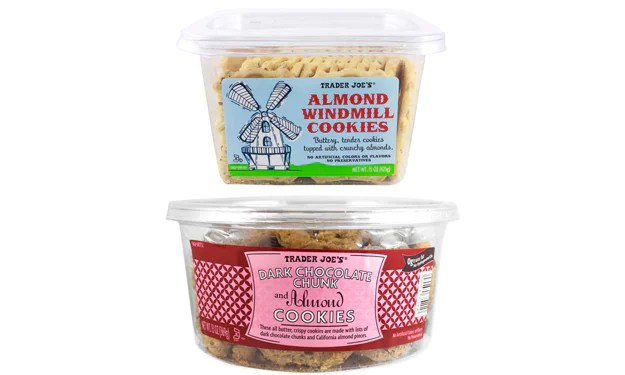Trader Joe’s Just Recalled 2 Cookie Products Because They May Contain Rocks—Here’s What To Know
Here's what to know about the Trader Joe's cookie recall—including which products were impacted and how a food safety expert advises you proceed if you encounter this...difficult to chew (sorry) situation.
What to know about the Trader Joe’s cookie recall
According to the statement released last Friday, Trader Joe’s Almond Windmill Cookies and their Dark Chocolate Chunk and Almond Cookies—with the sell-by dates October 19, 2023 - October 21, 2023, and October 17, 2023 - October 21, 2023, respectively—may contain rocks.
- Kelly Johnson-Arbor, MD, medical toxicologist and co-medical director of the National Capital Poison Center
Customers are urged to “not eat” the items in question and “discard the product or return it to any Trader Joe’s for a full refund.” You can also reach out to their customer relations department for further inquiries. That said, the company notes that “all potentially affected product has been removed from sale and destroyed.”

So, what happens if you accidentally eat rocks, according to a toxicologist?
According to Kelly Johnson-Arbor, MD, FACEP, FUHM, FACMT, a medical toxicologist and co-medical director at the National Capital Poison Center, several factors can dictate the potential gravity of the situation. First things first, the size of the rock matters (and, no, we’re not talking about engagement rings). “I took a look at the Trader Joe's recall statement, and it doesn't mention the size of the rocks. I assume they are small, like gravel, given that they were present in cookies,” Dr. Johnson-Arbor says.

{{post.sponsorText}}
But why does the size matter? If size is the only cause for concern, Dr. Johnson-Arbor, the smaller the rock, the better and less likely it is to cause any serious damage. “Small rocks, including gravel, are not absorbed by the human body and should not cause significant toxicity,” she says. On the other hand, what the rock is made of, regardless of its size, is extremely important to take into account. “If the rocks are contaminated with chemicals, heavy metals, or pesticides, there is the potential for toxic symptoms to develop,” Dr. Johnson-Arbor says. And should be avoided at all costs.
The good news? Let’s say you accidentally consume a cookie made up of non-toxic material that is small enough to go unnoticed—you’re likely out of the woods.
Keep in mind: This rule isn’t set in stone (pun intended) by any means. Rather, Dr. Johnson-Arbor explains that, in general, substances that are not absorbed by the human body should pass through the intestines and be excreted through the feces within a week or two.
What are more severe complications that can occur?
Although rare, some folks can experience more severe side effects from consuming rocks that would require immediate medical attention. “Some people may experience nausea after swallowing rocks, but people who experience more severe symptoms—including abdominal pain, vomiting, stomach bloating, constipation or fevers—after eating these recalled products should seek medical attention and/or contact poison control online at www.poison.org or by phone at 1-800-222-1222,” Dr. Johnson-Arbor says.
It’s also important to remember that the larger the rock, the higher the risk of experiencing any sort of complication. “Larger rocks can potentially get stuck in the throat or intestine and may cause an intestinal blockage or choking depending on where they get stuck,” Dr. Johnson-Arbor says. “These serious problems may be more likely to occur in young children, given their smaller body habitus, so parents and caregivers should not allow children to consume these recalled products, even if rocks are not immediately visible in the cookies,” she says.
And you may want to watch out for your chompers, as noshing on rock-laced cookies can easily destroy your pearly whites. All in all, when in doubt, throw it out.
A vegan chocolate chip cookie recipe with no hidden surprises:
Loading More Posts...